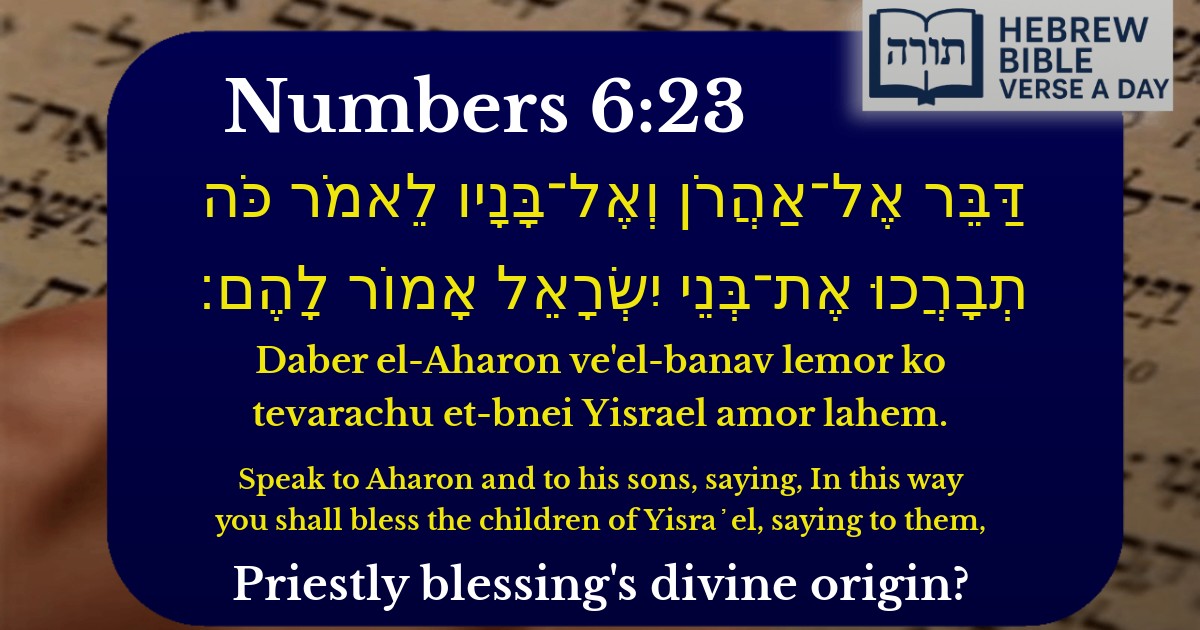Frequently Asked Questions
Q: What is the Birkat Kohanim (Priestly Blessing) mentioned in Numbers 6:23?
A: The Birkat Kohanim (Priestly Blessing) is a special blessing given by the Kohanim (descendants of Aharon) to the Jewish people. It consists of three verses (Numbers 6:24-26) and is recited during certain prayer services, such as Shacharit and Musaf on holidays. The Torah commands the Kohanim to bless the people with love and sincerity, as Rashi explains that the word 'כֹּה' ('in this way') implies that the blessing must be given with devotion and proper intention.
Q: Why does the verse specify that Aharon and his sons should give the blessing?
A: The verse specifies Aharon and his sons because the role of the Kohanim (priests) is to serve as spiritual intermediaries, bringing blessings from Hashem to the Jewish people. The Rambam (Hilchot Tefillah U’Nesiat Kapayim 15:1) explains that this mitzvah is unique to the Kohanim, as they were chosen for this sacred duty in the Mishkan (Tabernacle) and later in the Beit HaMikdash (Temple).
Q: How is the Birkat Kohanim performed today?
A: Today, the Birkat Kohanim is recited by Kohanim during the repetition of the Amidah in certain prayer services (primarily in Israel daily and in the Diaspora on holidays). The Kohanim wash their hands, remove their shoes, cover themselves with their tallit, and raise their hands while reciting the blessing word by word, as the congregation responds 'Amen.' The Shulchan Aruch (Orach Chaim 128) details the proper customs and laws for this practice.
Q: What is the significance of the Priestly Blessing in Jewish tradition?
A: The Priestly Blessing is a powerful spiritual gift from Hashem to the Jewish people, conveying divine protection, grace, and peace. The Talmud (Sotah 38b) teaches that the Shechinah (Divine Presence) rests upon the Kohanim when they recite this blessing. The Midrash (Bamidbar Rabbah 11:5) also explains that this blessing sustains the world and brings divine favor to those who receive it with proper reverence.
Q: Can a non-Kohen recite the Birkat Kohanim?
A: No, the mitzvah of Birkat Kohanim is specifically assigned to the Kohanim (descendants of Aharon). The Rambam (Hilchot Tefillah 15:6) states that if a non-Kohen attempts to recite the blessing in the manner of the Kohanim (with raised hands in the synagogue), he violates a prohibition. However, anyone may recite the words of the blessing as a personal prayer or when blessing one’s children, as the general concept of blessing others is a beautiful Jewish custom.


The Commandment of Birkat Kohanim
The verse (Bamidbar 6:23) commands Aharon and his descendants, the Kohanim, to bless the Jewish people with the formula known as Birkat Kohanim (the Priestly Blessing). Rashi explains that the phrase "כֹּה תְבָרֲכוּ" ("In this way you shall bless") indicates a fixed formulation given by Hashem, which the Kohanim must recite precisely as written, without alteration.
The Role of the Kohanim
The Rambam (Hilchot Tefillah U’Nesiat Kapayim 15:1) emphasizes that the Kohanim serve as conduits for divine blessing, but the actual blessing comes from Hashem. The Sforno adds that the Kohanim must be in a state of spiritual purity and proper intention (kavanah) when delivering the blessing, as their role is sacred.
The Structure of the Blessing
The Talmud (Sotah 38a) derives from the phrase "אָמוֹר לָהֶם" ("saying to them") that the Kohanim must recite the blessing aloud, not silently. Additionally, the Kohanim must face the congregation with love, as the Midrash (Bamidbar Rabbah 11:2) teaches that blessings given with a full heart are more potent.
The Power of the Priestly Blessing
The Zohar (Naso 146b) teaches that the threefold structure of the blessing (Bamidbar 6:24-26) corresponds to the three divine attributes of Chesed (Kindness), Gevurah (Strength), and Tiferet (Harmony), channeling divine abundance into the world. The Kohanim thus serve as instruments of Hashem’s benevolence.